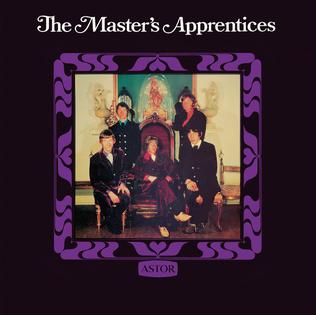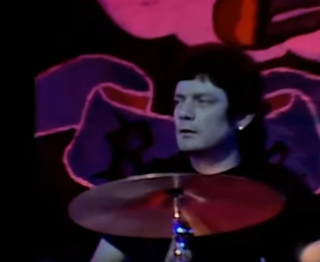Related Research Articles
Graeme Ronald Strachan, professionally billed and known as "Shirley" Strachan or Shirl, was an Australian singer, songwriter, radio and television presenter, and carpenter. He was the lead singer of the rock group Skyhooks. While still a member of Skyhooks he had solo singles, which charted on the Kent Music Report, with a cover recording of Brenda Holloway's "Every Little Bit Hurts" and a remake of The Miracles "Tracks of My Tears". After leaving Skyhooks in July 1978 he concentrated on his solo career. He was the host of children's TV program Shirl's Neighbourhood (1979–83), From 1993 he appeared on home renovation TV program, Our House, as a carpenter and co-host. At the ARIA Music Awards of 1993, Skyhooks were inducted into the ARIA Hall of Fame. Strachan died in August 2001 in a self-piloted helicopter accident.

The Encyclopedia of Australian Rock and Pop or Rock and Pop by Australian music journalist Ian McFarlane is a guide to Australian popular music from the 1950s to the late 1990s. The book has a similar title to the 1978 work by Noel McGrath, Australian Encyclopaedia of Rock and Pop, but is not otherwise related.
Schnell Fenster were a New Zealand rock band formed in Melbourne, Australia in 1986 by Noel Crombie on drums and percussion, Nigel Griggs on bass guitar and backing vocals, Phil Judd on lead vocals and guitar, and Eddie Rayner on keyboards and piano – who were all former members of New Zealand-formed rock group, Split Enz. Fellow founder, Michael den Elzen on lead guitar had worked with Tim Finn Band, another band formed by a Split Enz alumnus. Judd's band were briefly named The Wanx: but Rayner soon left and they changed their name to faux-German for "quick window", because it "appealed to [their] perversity". The group formed the core members of Noel's Cowards, a short-term ensemble, whose sole output was six tracks for the soundtrack of a feature film, Rikky and Pete, in 1988. Schnell Fenster released two studio albums, The Sound of Trees (1988) and Ok Alright a Huh Oh Yeah (1990), before disbanding in 1992. At the ARIA Music Awards of 1989 they were nominated for Breakthrough Artist – Album for The Sound of Trees, Breakthrough Artist – Single for "Whisper" and Best Cover Art for Judd's graphic art.
Patricia "Little Pattie" Thelma Thompson OAM is an Australian singer who started her career as a teenager in the early 1960s, recording surf pop, with her backing group The Statesmen, she subsequently went onto to record adult contemporary music.
Tin Tin was a pop rock band, which first formed in Australia as The Kinetics in 1966. They relocated to the United Kingdom in 1969 and were renamed as Tin Tin, which comprised Steve Kipner, Steve Groves, John Vallins and Geoff Bridgford (drums). In 1970 they issued a single, "Toast and Marmalade for Tea", which was a No. 10 hit on the Go-Set National Singles Chart in June the following year. It reached No. 20 in the United States on the Billboard Hot 100. Their next single, "Is That the Way?" (1971), peaked at No. 59 on the Billboard Hot 100.
Ronald Leslie BurnsAM is an Australian retired rock singer-songwriter and musician.
The Flying Circus were an Australian pop and country rock band with founding mainstays, Doug Rowe on lead guitar and vocals and Colin Walker on drums. They had three top 30 pop hits, "Hayride", "La La" and "Run Run Run", in Australia from 1968 to 1971. These were not typical of their live work nor later recordings. They re-located to Canada from 1971 to 1974 where they achieved chart success with "Old Enough " and "Maple Lady". Doug Rowe died in July 2015.

Supernaut were an Australian glam rock band from Perth. Formed as a pub-rock group, Moby Dick, by British-born brothers Chris Burnham on guitar and Joe Burnham on drums, they were joined late in 1974 by fellow immigrant Gary Twinn on lead vocals. After Randall Murphy joined on bass guitar, they changed their name. The group's debut single, "I Like It Both Ways", was produced by Molly Meldrum and was heavily promoted on his TV pop music show, Countdown. It peaked at No. 16 on the Kent Music Report singles chart. Their self-titled debut album reached No. 13 on the related Kent Music Report albums chart in November of that year. Murphy had left in June 1976 and was permanently replaced on bass guitar by Philip Foxman in August. The album provided another single, "Too Hot to Touch", which appeared at No. 14. In April 1979, the group shortened their name to the Nauts, returned to a heavier pub-rock sound and released a second album of that name in December 1979. They disbanded by March of the following year, with reformations occurring in 2007 and 2016.
Ray Brown & the Whispers were an Australian rock band from 1964 to 1967. Led by singer Ray Brown (1945–1996), with Lawrie Barclay on rhythm guitar, Al Jackson on lead guitar, Pat Jeffery on drums and John Manners on bass guitar. The group issued four albums, Ray Brown & the Whispers (1965), Hits & Brass (1965), Heading for the Top (1966) and Dance Dance Dance (1966). Their top 5 singles were the cover versions, "Pride", "Fool, Fool, Fool", "In the Midnight Hour" and "Tennessee Waltz Song". Their last single for 1966, "Too Late to Come Home" had the Bee Gees on backing vocals. Brown left the band before year's end and continued as both a solo artist and leader of new groups. The Whispers broke up in 1967. Brown died of a heart attack on 16 August 1996, aged 51.
The Groove was an Australian R&B, pop group which formed in early 1967 with the lineup of Geoff Bridgford on drums, Jamie Byrne on bass guitar, Tweed Harris on keyboards, Rod Stone on guitar and Peter Williams on lead vocals and guitar. In December 1967 their single, "Simon Says", peaked at No. 17 on the Go-Set National Top 40 Singles Chart. They followed with "Soothe Me", which peaked at No. 14 in April 1968. Also in April they released their self-titled debut album. In July that year they won the national final of the Hoadley's Battle of the Sounds competition with the prize including a trip to London. They relocated there in March 1969, and early the following year they changed their name to Eureka Stockade, they disbanded in 1971. On 13 October 2004 Tweed Harris died of throat cancer, aged 63.
James Keays was a Scottish-born Australian musician who fronted the rock band The Masters Apprentices as singer-songwriter, guitarist and harmonica-player from 1965 to 1972 and subsequently had a solo career. He also wrote for a music newspaper, Go-Set, as its Adelaide correspondent in 1970 and its London correspondent in 1973.
The Moir Sisters were a Scottish-Australian pop and folk vocal trio which formed in 1970 by the eponymous sisters, Jean, Margot and Lesley. Their debut single, "Good Morning " (1974), which featured their distinctive high-pitched harmonies, peaked at No. 8 on the Kent Music Report Singles Chart. The group released two albums, Lost: Somewhere Beyond Harmony (1974) and State of Shock, In 1989 Margot Moir released a solo single, "Scarlet Skies" and followed with her album, Strong and Mighty, in 1996. Margot died in 2015 from complications of her diabetes.

Digby George "Dig" Richards was an Australian rock and roll singer, songwriter, instrumentalist, musical theatre actor and television presenter, active during the late 1950s and early 1960s as lead singer with the R'Jays. Richards was the first Australian rock and roll artist to record a 12" LP record in Australia, with the self-titled album Dig Richards, released in November 1959. From 1971 he performed as a solo country music artist. According to the Kent Music Report he had four Top 30 national hit singles, "(My) Little Lover" / "Quarrels ", "A Little Piece of Peace", "People Call Me Country" / "The Dancer", and "Do the Spunky Monkey". On 17 February 1983 Digby Richards died of pancreatic cancer, aged 42. He was survived by his wife, Sue and two children.
Andrew MacLeish Durant was an Australian musician-songwriter. He was a member of country rock group Stars (1976–79) providing guitar, harmonica, and backing vocals. He was also a session and backing musician for a range of artists. He died of cancer, aged 25. On 19 August 1980 a tribute performance was held in his honour, with a live double-album recorded by various artists, Andrew Durant Memorial Concert, which was released on 9 March 1981. All but three tracks were written by Durant. It peaked at No. 8 on the Australian Kent Music Report Albums Chart and reached No. 40 on the End of Year Top 100 Albums Chart for 1981.
"Undecided" is the debut single by Australian rock group, the Masters Apprentices, which was issued in October 1966 on Astor Records. It peaked at No. 13 on the Go-Set national singles charts. It was included on The Masters Apprentices debut EP and The Masters Apprentices debut studio album, both released in 1967.
"Buried and Dead" is a song by Australian rock group, the Masters Apprentices, released in May 1967 on Astor Records as the second single from the band's debut self-titled extended play. It peaked at No. 26 on the Go-Set national singles charts.

The Masters Apprentices is the self titled debut studio album by the Masters Apprentices, released in June 1967 on Astor Records. It featured two hit singles; "Undecided" and "Buried and Dead", both of which has been released on The Masters Apprentices EP in February 1967.

Dallas Leslie "Digger" Royall was an Australian hard rock drummer. He was a member of Band of Talabene (1973), Buster Brown (1975) and Rose Tattoo (1976–1983). He died of an unspecified cancer in 1991 while being treated for heroin and alcohol addictions.
New Dream were an Australian pop music group formed in 1967 as The Dream when founding mainstays Jenny Johnston on organ and Alex Kadell on lead vocals joined with latter day members of the Final Four. The Dream's repertoire shifted to bubblegum pop and they changed their name in March 1969. Their most popular single, "Soft Delights", peaked at No. 21 on the Go-Set national top 40. They released a sole album, New Dream, in 1973 however they had disbanded late in the previous year. They briefly reformed in 1974 before breaking up again.
Jay Justin McCarthy is an Australian rock singer and songwriter. He had a top ten hit with "Proud of You" which earnt him Australia's first silver record. Early singles he released include "Sweet Sensation", "Why Don't You Try?" and "Promise Me". Justin's song writing credits include "My Blond Headed Stompie Wompie Real Gone Surfer Boy" and ""We're Gonna Have a Party Tonight" for Little Pattie, an artist he is credited with discovering.
References
- ↑ McGrath, Noel (1984), Noel McGrath's Australian encyclopaedia of rock & pop ([Rev. ed.] ed.), Rigby, ISBN 978-0-7270-1909-7
- ↑ McGrath, Noel (1988), Noel McGrath's ultimate success, Paradise Publications, ISBN 978-0-9588079-0-6
- ↑ "The All Stars [Australia] - Discography". 45cat. Retrieved 6 June 2017.
- ↑ Laird, Ian. "The Sixties: Australian rock & pop recordings, 1964-1969" (PDF). National Film & Sound Archive. p. 3. Retrieved 6 June 2017.
- ↑ "Music - Australian Encyclopaedia of Rock". Tharunka . Vol. 24, no. 28. New South Wales, Australia. 30 October 1978. p. 20. Retrieved 6 June 2017– via National Library of Australia.
- ↑ Ferrington, Andrew (30 January 1985). "Things to browse through while the music plays". Canberra Times . Vol. 59, no. 18, 021. p. 18. Retrieved 6 June 2017.
- ↑ "Put some fun into work: author". Canberra Times. Vol. 67, no. 21, 022. 2 November 1992. p. 13. Retrieved 6 June 2017.